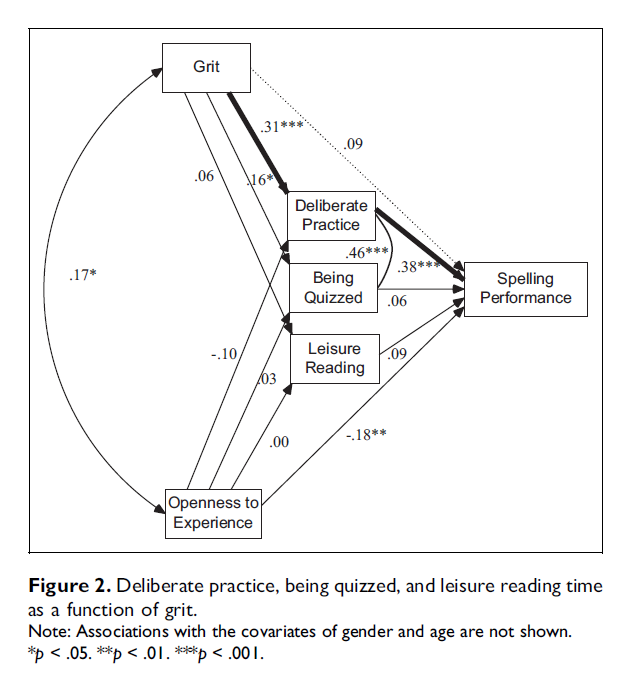In this study, the specific reasons why grittier spelling bee finalists reach higher rounds was assessed. The observation that grit correlates with spelling bee performance had already been made.
Grit was found to predict two behaviors which in turn lead to increased performance – more practice, and better practice.
More practice is self-explanatory – the more a skill is cultivated, the better that skill becomes. However, recent research has shown that there are different types of practice, each with different uses and different effects.
The most useful practice is also the most difficult – deliberate practice (Talent is Overrated is a good book on the subject). Grittier individuals were found to engage in more deliberate practice, which in turn also lead to increased performance.
Click here to learn more about grit.
Study Details
Hypothesis: Grittier individuals are more likely to engage in deliberate practice, which in turn is more likely to lead to higher performance.
Methods: 190 finalists in the national spelling bee completed a number of questionnaires.
Measures: Grit and openness to experience were compared against performance.
Competitors completed a grit and openness to experience questionnaire. They also indicated how many hours they spent in the last 4 weeks doing certain kinds of activities, like deliberate practice (e.g. studying words on their own), leisure reading (e.g. comics and novels), testing current knowledge (e.g. having a parent quiz them), and several controls. For each activity, they also indicated how enjoyable, effortful, and relevant they thought it was.
Results: The hypothesis was partially confirmed.
“Deliberate practice time predicted performance in final competition better than time being quizzed or leisure reading time.”
Grit, in turn, predicted the amount of deliberate practice time, partially explaining why grittier individuals performed better.
With increased experience, competitors spent more time training overall but also increased the proportion of the time they spent on deliberate practice.
Concerns: Self-report, reflective measures of enjoyment can be poor representations of moment-by-moment experience (e.g. Mihaly Csikszentmihalyi and work). As such, it's possible that deliberate practice was not actually less enjoyable; it just appeared to be less enjoyable (for one of many possible reasons – e.g. expectation that hard work is not enjoyable, the poor mental model of well-being, etc…).
Questions: Would an experience sampling measure of enjoyment change the conclusion that deliberate practice is less enjoyable than leisure? If not, why do the authors imply it is good that the finalists spent hundreds of hours forgoing leisure activity? Were the finalists more satisfied with their lives than those who practiced less (or some other measure of well-being, e.g. meaning)? The implication from the study is that we intuitively understand that deliberate practice is better for us, but shy away from it due to lack of grit. Is this true of other domains as well?
Does grit have any correlation with perceived enjoyment of deliberate practice?
31 Awesome Benefits of Gratitude you had no Idea About!
Duckworth, A. L., Kirby, T., Tsukayama, E., Berstein, H., Ericsson, K. (2010). Deliberate practice spells success: Why grittier competitors triumph at the National Spelling Bee. Social Psychological and Personality Science, 2, 174-181.

